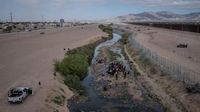Tijuana is a city located in northern Mexico, directly on the border with the United States, renowned for both its allure and peril. While it thrives on tourism and U.S. businesses that benefit from cheap manufacturing, it also grapples with severe challenges including high murder rates and the influence of drug cartels. Recently, Tijuana has faced an alarming shortage of water, exacerbated by political tensions and ongoing disputes over resource allocation with the U.S., especially under President Donald Trump's administration.
The tension escalated dramatically on March 20, 2025, when the water crisis in Tijuana reached a critical point. For many years, the U.S. and Mexico have relied on an agreement from 1944 which required the U.S. to send millions of liters of water from the Colorado River to Mexico. In return, Mexico was to supply water to the Río Bravo, known as the Rio Grande in the U.S. This long-standing arrangement has provided agricultural prosperity on both sides until recent droughts turned the situation dire.
As northern Mexico suffers from persistent drought, farmers have protested against water flowing north to the U.S., demonstrating their frustration with the perceived inequity between the two countries. These frustrations became palpable in 2024 when a sugar mill in Texas shut down, attributed to the lack of water from Mexico, pushing local farmers to voice their anger regarding Mexico's non-compliance with water delivery obligations.
The U.S. and Mexico, however, find themselves intertwined in this water conflict, heavily dependent on each other for agricultural stability. Tijuana is currently 90 percent reliant on the Colorado River for its water. In November 2024, after months of negotiations, a new agreement was struck that would see Mexico conducting earlier water deliveries while promising to implement measures to conserve water usage for the benefit of both nations.
Despite these optimistic developments, under Trump’s renewed leadership this year, relations have significantly soured. Trump stunned many when he threatened a 25 percent tariff on nearly all imports from Mexico, an action temporarily placed on hold but indicative of rising tensions. This hostility towards Mexico raises questions about the sustainability of the previous agreements, particularly as the Trump administration emphasizes exerting maximum pressure on Latin American countries.
Most recently, the U.S. government outright rejected a plea from Mexico for a special water delivery to address the urgent shortages in Tijuana. The U.S. State Department cited “continued failures” by Mexico to comply with the 1944 treaty as the rationale for their refusal. “This is excellent,” declared Republican Congressman Ted Cruz, who pointed to the impact of Mexico’s non-compliance on Texan agriculture, which is experiencing its own water crisis.
México's President Claudia Sheinbaum had cultivated a seemingly good rapport with Trump, which makes the recent escalation of tensions unexpected. Historically, their relationship has glossed over much of the friction that typically arises between the two nations. In light of the mutual agricultural distress exacerbated by the climate crisis, the precarious relationship between the U.S. and Mexico could see drastic repercussions for countless lives reliant on these water sources.
Sheinbaum has acknowledged the ongoing water challenges, stating, “It is part of the problem,” calling on Trump's administration to reconsider their position, especially considering that many areas in northern Mexico are rendered unsuitable for agriculture under climate change conditions. Farmers in these regions face desolate fields and minimal water for irrigation. As conditions worsen, many locals see migration to the U.S. as the only viable option for survival.
The outcry for urgent action to tackle these water shortages reflects broader discontent in Mexico concerning U.S. foreign policy. The Trump administration's approach represents a shift towards more aggressive posturing, fostering uncertainty about long-standing agreements that had benefitted both nations. These developments reiterate the need for renewed bilateral relations, particularly in a time of climatic distress, to avert a humanitarian crisis at the border.
Overall, the intertwining fates of Tijuana and the U.S. raise pressing questions about cooperation over shared resources in an era marked by climatic variability and political antagonism. As the climate crisis threatens traditional agricultural practices, long-term solutions and collaborations are urgently needed to ensure future sustainability for the region.




